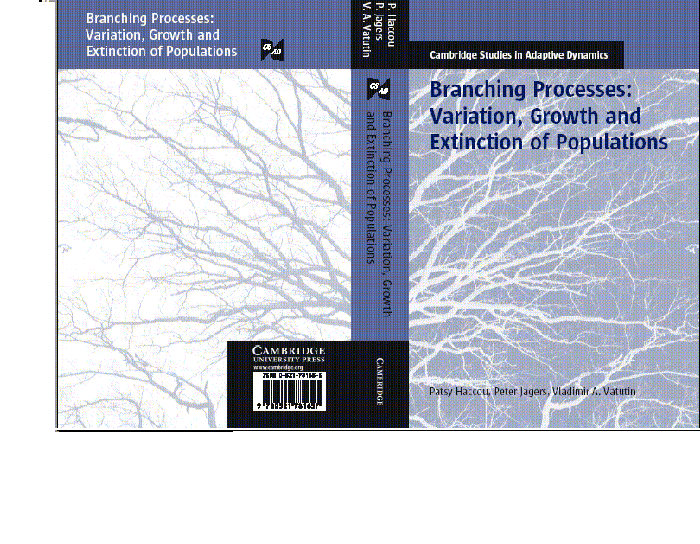Symposium: Branching in Biology
Gothenburg, 22-26 May, 2005
The state of the art is manifested in the book,
- Branching Processes: Variation, Growth, and Extinction of Populations by P. Haccou, P. Jagers, V. Vatutin et al., Cambridge University Press (May 2005).
This symposium will discuss the state and future of branching processes in biology in connection with the book appearing.
Practical information
Please, go to
Invited Participants
Marina Alexandersson, Fraunhofer Chalmers CentreGerold Alsmeyer, Münster: A Stochastic Fixed Point Equation for Weighted Minima and Maxima.
Andrew D. Barbour, Zürich: Branching with countably many types.
Ulf Dieckmann, IIASA, Laxenburg: Invasion analysis and the canonical equation of adaptive dynamics in fluctuating environments.
Michel Durinx, Leiden .
Miguel Gonzalez, Extremadura.
Patsy Haccou, Leiden
Göran Högnäs, Åbo
Fima Klebaner, Monash: Large Deviations for simple branching model. Extinction time asymptotics.
Christine Jacob, INRA: The problem of estimation of persistent or transient phenomena in size-dependent branching processes. Theory and examples.
Peter Jagers, Chalmers and Gothenburg: Before extinction.
Vincent Jansen, Royal Holloway, London: Modelling outbreaks of meningococcal disease.
Marek Kimmel, Rice: Alternative to the Wright-Fisher model and estimation of the age of mt Eve.
Thomas G. Kurtz, Madison: Branching-like properties in models of intracellular chemical reactions.
Amaury Lambert, École normale supérieure, Paris: The logistic branching process, coalescence with fragmentation, and fixation of mutant alleles.
Sara Larsson, Lund
Rodrigo Martinez, Extremadura: Bisexual branching processes in a genetic context: the extinction problem for Y-linked genes.
J. A. J. Metz, Leiden: On the canonical equation of (directional) adaptive dynamics for physiologically structured populations.
Manuel Mota, Extremadura: Extinction versus unlimited growth of multitype populations.
Peter Olofsson, Rice: Exact sampling formulas for multi-type Galton-Watson processes
Inés del Puerto, Extremadura.
Anthony G. Pakes, Western Australia: Quasi-stationary measures for discrete-state Markov processes where absorption is not certain.
P. R. Parthasarathy, IIT Madras, Exact transient solution of a state-dependent birth-death process
Alfonso Ramos, Extremadura: Animal population dynamics modelling through controlled bisexual branching processes: estimation from a Bayesian outlook
Uwe Rösler, Kiel: New results on the weighted branching process.
Brita Ruths, Åbo
Serik Sagitov, Chalmers: Time reversed Galton-Watson processes in the linear fractional case.
Sergei V. Semovski, Siberian Academy of Science: Molecular evolution of adjacent one-dimensional populations.
Maria Conceicao Serra, Braga/Gothenburg: From mutation to explosion of subcritical populations
Maroussia Slavchova-Bojkova, Bulgarian Academy of Science: Limit theorems for subcritical age-dependent branching processes with two types of immigration.
Simon Tavaré, Cambridge and USC: Stem cell evolution in the colon.
Vladimir Vatutin, Steklov Institute: Branching processes in random environment and "bottleneck"s in evolution of populations
Tentative time schedule
- Programme. NEW

Back to Stochastic Centre
Last modified:
